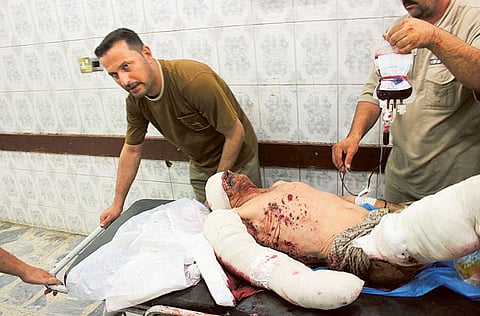Sectarian mosque attacks in Iraq kill 9
Tensions between Sunnis and Shiites have been inflamed by the civil war in neighbouring Syria

Baghdad: Iraqi officials say a Shiite and a Sunni mosque in Baghdad have been targeted in bombings that killed at least nine people.
Police officials say a suicide bomber set off his explosives on Shiite worshippers as they were leaving Assad Allah mosque in the city’s suburb of Hussainya late on Tuesday.
Seven people died and 11 were wounded in that attack. And in western Baghdad, a bombing on Tuesday night near a Sunni mosque killed two worshippers. Hospital officials confirmed the death tolls in the two attacks. All officials spoke on condition of anonymity because they are not authorised to talk to the media.
Violence has escalated in Iraq, especially since the start of the Muslim holy month of Ramadan earlier in July. Lingering tensions between Sunnis and Shiites have been inflamed by persistent violence in Iraq and the civil war in neighbouring Syria, and there are growing fears that the country is slipping back towards all-out sectarian conflict. Iraq has faced years of attacks by militants, but analysts say widespread discontent among members of its Sunni Arab minority that the government has failed to address has fuelled the surge this year.
Iraq’s Sunni Arabs accuse the Shiite-led government of marginalising and targeting their community, including through unwarranted arrests and terrorism charges. Protests broke out in Sunni-majority areas at the end of 2012 and are continuing.
In addition to the major problems with security, the government in Baghdad is also failing to provide adequate basic services such as electricity and clean water, while corruption is widespread. Political squabbling has further paralysed the government, which has passed almost no major legislation in years.



